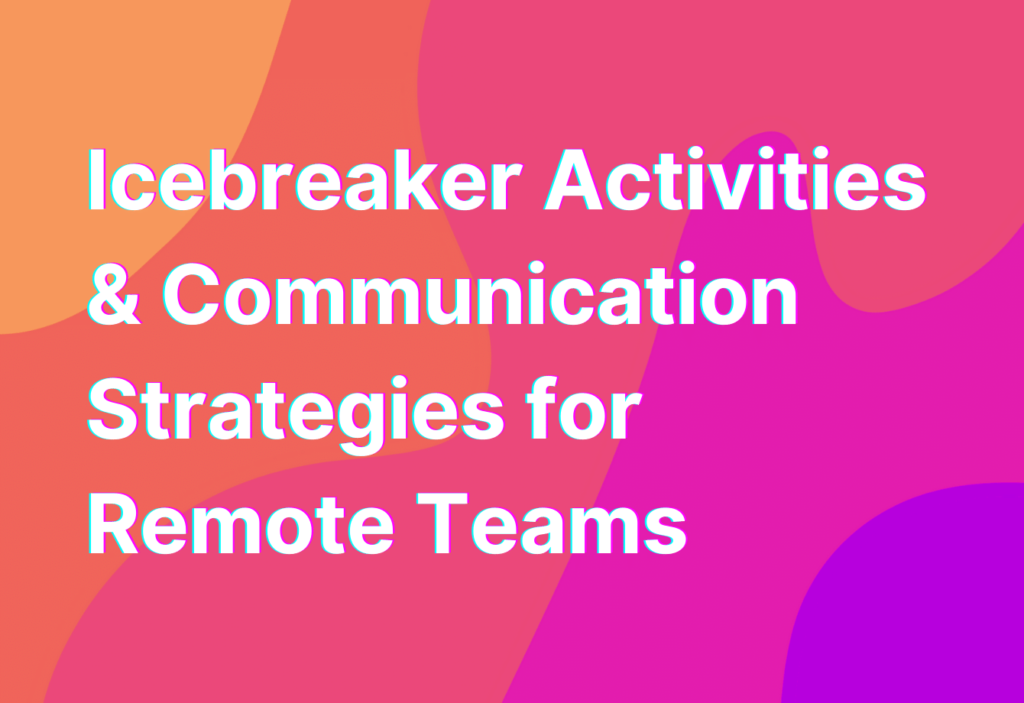Icebreaker Activities & Communication Strategies for Remote Teams
Working remotely has become increasingly popular in recent years, and with good reason. It offers flexibility, eliminates commuting time, and allows for a better work-life balance. However, one challenge that remote teams often face is building strong relationships and fostering effective communication. That’s where icebreaker activities and communication strategies come in. In this article, we’ll explore some fun icebreaker activities and communication strategies that can help remote teams connect and collaborate more effectively.
Icebreaker Activities
Icebreaker activities are a great way to break the ice (pun intended) and get to know your remote team members on a more personal level. Here are some fun icebreaker activities that you can try with your remote team:
- Two Truths and a Lie: Each team member shares two true statements and one false statement about themselves. The rest of the team tries to guess which statement is the lie.
- Virtual Scavenger Hunt: Create a list of items or tasks that team members need to find or complete within a certain time frame. The first person or team to complete the scavenger hunt wins.
- Emoji Storytelling: Each team member chooses an emoji and tells a story based on that emoji. This activity encourages creativity and can lead to some interesting and entertaining stories.
- Virtual Trivia: Create a trivia game using a platform like Kahoot or Quizizz. Choose a theme that everyone can relate to and let the friendly competition begin.
- Virtual Coffee Break: Schedule a virtual coffee break where team members can relax, chat, and get to know each other in a more informal setting. Encourage everyone to bring their favorite beverage and share something interesting about themselves.
These icebreaker activities can help create a sense of camaraderie and build stronger relationships within your remote team. They also provide an opportunity for team members to showcase their personalities and interests outside of work.
Communication Strategies
Effective communication is crucial for remote teams to collaborate successfully. Here are some communication strategies that can help improve communication within your remote team:
- Establish Clear Communication Channels: Determine which communication channels will be used for different types of communication. For example, use email for formal communication, instant messaging for quick questions, and video calls for more in-depth discussions.
- Set Expectations: Clearly communicate expectations regarding response times, availability, and preferred communication methods. This helps ensure that everyone is on the same page and knows what is expected of them.
- Encourage Regular Check-Ins: Schedule regular check-ins with team members to discuss progress, address any challenges, and provide feedback. This helps keep everyone accountable and ensures that everyone is on track.
- Use Collaboration Tools: Utilize collaboration tools like Trello, Asana, or Slack to keep everyone organized and on the same page. These tools allow for easy task management, file sharing, and real-time collaboration.
- Practice Active Listening: When communicating with your remote team members, practice active listening by fully focusing on what they are saying, asking clarifying questions, and summarizing key points. This helps ensure that everyone feels heard and understood.
By implementing these communication strategies, you can foster a more collaborative and productive remote team environment. Effective communication is the key to successful remote work.
Wrapping Up
Building strong relationships and fostering effective communication within remote teams is essential for success. Icebreaker activities can help break down barriers and create a sense of camaraderie, while communication strategies ensure that everyone is on the same page and working towards common goals. By incorporating these activities and strategies into your remote team’s routine, you can create a more connected and productive work environment.
For more tips on boosting job satisfaction and improving remote team communication, check out our article on Job Satisfaction. Remember, effective communication is the key to a successful remote team!


